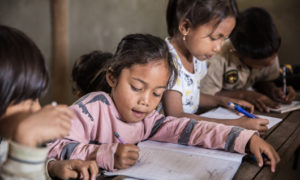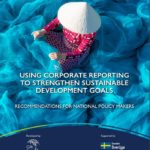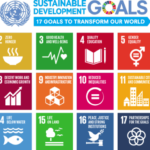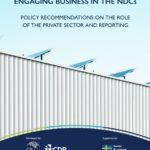
Sustainability reporting can support companies’ contribution to poverty alleviation. So how can we maximize its impact to help reach the Sustainable Development Goal (SDG) of no poverty by 2030? A new paper by GRI outlines recommendations and specific disclosures that companies can apply. SDG 1 aims to end poverty by 2030, and the private sector is key to its success. Although poverty can potentially impact a business in many ways, depending on its location and sector, and although they report on many issues that are related to poverty, few companies refer directly to poverty in their sustainability reports.
With the support of the UK’s Department for International Development (DFID) and the Swedish International Development Cooperation Agency (Sida), GRI has carried out research into the opportunities companies have to report on their contribution to poverty alleviation in different contexts. Through focus groups and interviews, as well as an analysis of 107 GRI-based sustainability reports, GRI has identified six areas with corporate responses to poverty: philanthropy, community engagement, risk, operating context, direct and indirect economic impacts, and business development.
You can read more in GRI’s 2017 publication Can corporate reporting help end poverty?, which showed the ways in which companies report on their contribution to poverty alleviation. Some companies even refer to poverty as a business risk, as they are “missing an opportunity to consider the impact that poverty can have or is having on the business.”
A follow-up discussion paper, Corporate Reporting on Poverty, published today, takes the findings a step further, providing practical assistance to organisations in their reporting on poverty. It features an in-depth analysis of the most recent reports of three leading companies from different sectors that face challenges and opportunities in addressing poverty.
The paper also helps identify opportunities for GRI to drive more and better corporate reporting on poverty alleviation, as it provides a set of suggested disclosures and associated actions based on an expert workshop and the results of desk research.
“We’re continuing this research initiative and connected work to stimulate improvement – not only do we want to review what companies are doing already and identify opportunities on what more they can do, we also want to clarify expectations of corporate reporting on poverty,” said Juliette Gaussem, Senior Manager Guidance & Practice at GRI. “And focusing on GRI’s role in poverty-related reporting, we also want to ensure reporting standards evolve in parallel with business practices in this area.”
Practical steps forward
The paper concludes with a set of recommendations for companies, as well as next steps for GRI. Companies are encouraged to:
- Reference poverty context
- Be consistent and measurable
- Look beyond SDG 1
- Look at the broader outcomes
- Link impacts to strategy
GRI will now begin to build on the approach and findings outlined in paper, looking at the proposed poverty-related disclosures and working closely with the Corporate Action Group for Reporting on the SDGs. This input will inform the revision of existing GRI Standards and the development of potential new Standards.
We will also review opportunities to identify and share leading examples of corporate disclosure and action on inclusive business opportunities – one of the areas identified as having the greatest potential impact. And GRI will continue its work with external stakeholder groups to deepen an appreciation of the nature and value of GRI reporting, and of their role as stakeholders in using these reports to foster greater accountability, innovation and performance on poverty-related issues.
Corporate reporting on contributions to poverty alleviation can only have an impact if companies report well; GRI will further its efforts to drive the uptake of effective reporting practice among companies and in countries where poverty is most prevalent, such as sub-Saharan Africa and Southeast Asia. GRI aims to inform policy developments, build reporting capacity and share leading edge examples, to encourage more and better reporting on poverty.



